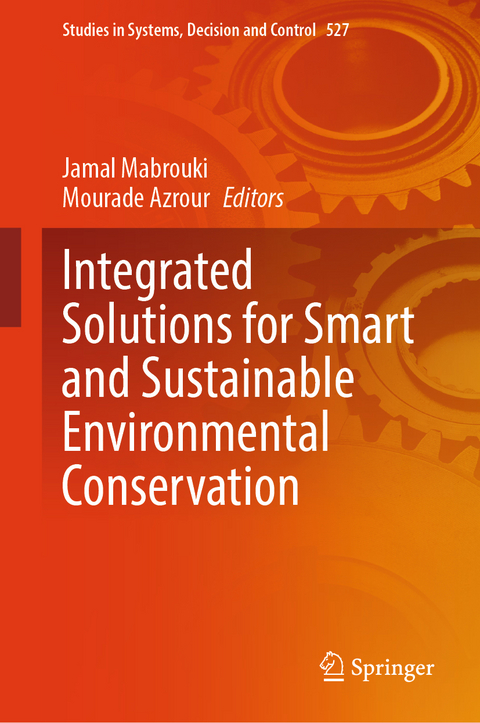
Integrated Solutions for Smart and Sustainable Environmental Conservation
Springer International Publishing (Verlag)
978-3-031-55786-6 (ISBN)
Resource depletion and ecological risks are more than ever at the heart of societal and economic debates. In the 1970s, the developed countries saw the Fordist growth regime crumble in parallel with the growing awareness of the ecological issue. Since the first industrial revolutions, technological dynamics have been the cause of many environmental problems, and there is a consensus on the diagnosis. Integrated technologies reduce resource use and/or pollution at source by using cleaner production methods. This generally leads to a reduction in the by-products, energy inputs and resources used by companies to produce goods.
Integrated production technologies reduce negative environmental impacts at source by substituting or modifying cleaner technologies. Examples of integrated, or cleaner, production technologies are the recirculation of materials, the use of environmentally friendly materials (such as the substitution of water for organic solvents), etc. However, the implementation of integrated production technologies is often hampered by obstacles related to cost, coordination and skill inertia problems and to the productive organisation of companies. In addition to the high investment costs of new integrated technologies, additional barriers may emerge depending on the nature of the environmental problem and the type of environmental regulation in question.
Jamal Mabrouki received his PhD in Process and Environmental Engineering at Mohammed V University in Rabat, specializing in artificial intelligence and smart automatic systems. He completed the Bachelor of Science in Physics and Chemistry with honors from Hassan II University in Casablanca, Morocco and the engineer in Environment and smart system from Ibn Zohr University. His research is on intelligent monitoring, control, and management systems and more particularly on sensing and supervising remote intoxication systems, smart self-supervised systems and recurrent neural networks. He has published several papers in conferences and indexed journals, most of them related to artificial intelligent systems, internet of things or big data and mining. Jamal will currently work in environment, energy and smart system professor at Mohammed V University in Rabat, Faculty of Science. Jamal is scientific committee member of numerous national and international conferences. He is also a reviewer of Modeling Earth Systems and Environment; International Journal of Environmental Analytical Chemistry; International Journal of Modeling, Simulation, and Scientific Computing; The Journal of Supercomputing and Big Data Mining and Analytics.
Prof. Mourade Azrour received his PhD from Faculty of sciences and Techniques, Moulay Ismail University of Meknes, Morocco. He has received his MS in computer and distributed systems from Faculty of Sciences, Ibn Zouhr University, Agadir, Morocco in 2014. Mourade currently works as computer sciences professor at the Department of Computer Science, Faculty of Sciences and Techniques, Moulay Ismail University of Meknès. His research interests include Authentication protocol, Computer Security, Internet of things, Smart systems, Machine learning and so ones. Mourade is member of the member of the scientific committee of numerous international conferences. He is also a reviewer of various scientific journals. He has published more than 60 scientific papers and book chapters. Mourade has edited 2 scientific books "IoT and Smart Devices for Sustainable Environment" and "Advanced Technology for Smart Environment and Energy". Finally, he has served as guest editor in journals "EAI Endorsed Transactions on Internet of Things", "Tsinghua Science and Technology", "Applied Sciences MDPI" and "Sustainability MDPI"
Chapter 1. Introduction to Advanced Technology for smart environment and water.- Chapter 2. Evolving Technologies: IoT and Artificial Intelligence for environment and water.- Chapter 3. Smart environment and water Systems.- Chapter 4. Data Science for environment and water Informatics.- Chapter 5. Robotics and Process Automation Technologies for Advanced Technology for smart environment and water.- Chapter 6. Blockchain in water Informatics.- Chapter 7. Bioinformatics, smart environment to Informatics and Analytics.- Chapter 8. Augumented Reality in smart environment.- Chapter 9. Security and Privacy Solutions in smart environment.- Chapter 10. Image Processing in environment.- Chapter 11. Communication Technologies for Future Smart environment and water.- Chapter 12. Wireless Body Area Networks and Smart Wearable's for environment and water.- Chapter 13. Future Prospects and Applications of environment and water.- Chapter 14. Conclusion.
| Erscheinungsdatum | 30.04.2024 |
|---|---|
| Reihe/Serie | Studies in Systems, Decision and Control |
| Zusatzinfo | VI, 201 p. 87 illus., 78 illus. in color. |
| Verlagsort | Cham |
| Sprache | englisch |
| Maße | 155 x 235 mm |
| Themenwelt | Geisteswissenschaften ► Archäologie |
| Informatik ► Theorie / Studium ► Künstliche Intelligenz / Robotik | |
| Mathematik / Informatik ► Mathematik ► Angewandte Mathematik | |
| Technik | |
| Schlagworte | Analytical Chemistry • climate change • Nature-based Approaches and Solutions • Smart environment • Sustainable Management of Soil • Water, Energy Food "Nexus" • Water Engineering and Technologies Inputs • water resources |
| ISBN-10 | 3-031-55786-7 / 3031557867 |
| ISBN-13 | 978-3-031-55786-6 / 9783031557866 |
| Zustand | Neuware |
| Informationen gemäß Produktsicherheitsverordnung (GPSR) | |
| Haben Sie eine Frage zum Produkt? |
aus dem Bereich


